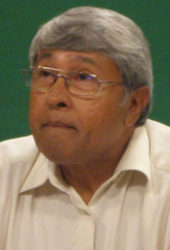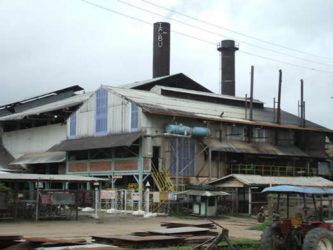As the increasingly intense public and political discourse on the future of the country’s sugar industry persists, Guyana Sugar Corporation (GuySuCo) Chief Executive Officer Errol Hanoman has pointedly declared that providing the sector with annual multi-billion-dollar handouts is both unwise and unsustainable.
“Are we going to run the rest of the country down just to keep GuySuCo going?” Hanoman asked.

Errol Hanoman
“The tragedy is that this money is coming into sugar, but it is not doing a thing to make the industry more viable. All that is happening right now is that GuySuCo is being treated like an employment bureau. We are simply using the money to employ people. One does not need to do an MBA or a Phd to know that we can take that money and go into other businesses that would make a profit and would provide employment for those sugar workers for years to come. Sugar as is presently structured has no future if viability and profitability are the yardsticks by which we work.”
Hanoman told Stabroek Business that GuySuCo had established that there are a few estates that can be made profitable. “With regard to the others we can do nothing,” he said, adding that by seeking to salvage in entire industry in its present state the corporation has, in fact, been denying those good estates the support that they need to ensure their own chances of survival.

And according to the CEO the best-case scenario for GuySuCo, going forward, was “a smaller sugar industry with quite a significant diversification programme” adding that a point had been reached where it had become necessary to cease to deal with the sugar industry from “an emotional, sentimental position.” He said that with $18 billion having been allocated to the sector next year and a further $20 billion in 2018 it begs the question as to where the money is to come from to run the rest of the country.
In further pressing the case for what he said was the necessity for a shift from the prevailing order, Hanoman stressed, “Where we are going at the moment, if something drastic doesn’t happen we will wake up one morning and find that we have to close the doors.”
According to him, cutting costs raises the inevitable political issue of “troubling the head count,” in the industry and the issue of mechanization has its own challenges including the necessity for “deep pockets” and “knowledge and experience to manage the technology, the climate and the soils…” However, the reality is that the sugar industry as structured at present will never make a profit.
Hamoman related a theoretical exercise undertaken in 2015 in which GuySuCo was provided all of the capital that it needed in order to get its productivity up. “We discovered that if we did that, by 2025 it would make 331,00 tonnes of sugar, but in each of the years up to 2025, because of the disparity between prices and cost of production, GuySuCo would lose in excess of $10 billion per year. With those types of losses GuySuCo would not reach 2025. He noted that while the assessment of the exercise by GAWU found comfort in sugar production topping 300,000 tonnes, that assessment failed to take of the extent of the financial loss that would accrue in the process.
Hanoman, who returned last year for his second stint as head of the deeply troubled state-run sugar industry having previously served as CEO between 2009 and 2010, made no bones about the fact that he clearly believes sugar is the burden on the back of the country’s economy, and the need to move with even greater haste in the direction of remedial measures which must, of necessity, include the diversification of the industry.
And according to Hanoman, between January 2000 and September this year the industry had lost more than one million man days as a result of strikes arising out of a protracted adversarial industrial relations climate between the company and the unions. “When you look at GuySuCo, this is a significant part of what is responsible for the state of the industry. Strikes have had a serious impact on the performance of the industry,” Hanoman said.
He noted that while there have been times when the management of GuySuCo made mistakes the industry has had to bear the burden of an industrial relations climate that continues to be driven by a political agenda. This, he said, has had a critical bearing on decision-making at the union level as far as the taking of industrial action is concerned, adding that the majority of the strikes called in the industry last year were “unjustified.
On the issue of diversification, Hanoman disclosed that GuySuCo had already had discussions with financial institutions and that “one in particular has said that they have no difficulty in studying how we can transition sugar workers into farmers.” He said that there was a second financial institution that had already voiced its support for the project, in principle, “when they visited Guyana not too long ago.”





